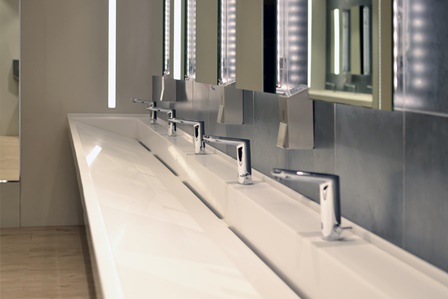Commercial properties, such as office buildings, retail stores, and restaurants, frequently encounter challenges due to their high-traffic nature and complex plumbing systems. Timely resolution of these issues is critical to avoid disruptions to daily operations and ensure a clean, safe, and comfortable environment for employees and customers.
In this article, we’ll delve into some of the most common commercial plumbing problems and provide guidance on when it’s time to call a professional plumber for assistance.
1. Blocked Drains
Blocked drains are common in commercial settings, with large amounts of waste and debris flowing through the plumbing system. Signs of a blocked drain include slow-draining water, unpleasant odors, and water pooling around floor drains.
To prevent blockages, it’s crucial to routinely clean drains and avoid disposing of items like grease, food particles, and paper towels down the sink. If a blockage persists or worsens, it’s best to call and hire a plumber to assess and clear the obstruction. To better understand the importance of having a qualified professional and how to pick one, take a moment to learn more.
2. Leaking Pipes and Fixtures
Leaks can occur in pipes, faucets, and other fixtures, causing water damage, mold growth, and increased water bills. Some leaks, such as dripping faucets, are visible, while others may be hidden behind walls or beneath floors.
Keep an eye out for signs of leaks, such as water stains, mold, and damp odors. Regularly inspect exposed pipes and fixtures for signs of wear or corrosion. If a leak is suspected or discovered, it’s essential to contact a plumber to repair the issue quickly.
3. Water Heater Issues
Commercial properties often rely on water heaters to provide hot water for various purposes, such as restrooms, kitchens, and laundry facilities. Common water heater problems include insufficient hot water, fluctuating water temperatures, and strange noises from the unit.
Regular maintenance, such as flushing the tank and inspecting for signs of wear, can help prevent issues. However, if problems persist, it’s best to call a plumber to diagnose and fix the water heater.

4. Sewer Line Problems
Sewer line issues can cause significant disruptions to a commercial property, as they may result in unpleasant odors, sewage backups, and even health hazards. Common causes of sewer line problems include tree root intrusion, pipe collapses, and blockages.
It’s important to address any signs of a sewer line issue immediately by hiring a plumber. A professional can use specialized equipment, such as video inspection cameras, to identify the problem and recommend the most effective repair solution.
5. Toilet and Urinal Problems
In commercial settings, toilets and urinals are subject to heavy usage, leading to various issues, such as clogs, leaks, and malfunctioning flush valves. Regular cleaning and maintenance can help minimize problems, but it’s essential to call a plumber if a toilet or urinal becomes blocked or starts to leak. A professional can also recommend and install high-efficiency fixtures to help reduce water usage and save on utility costs.
6. Grease Trap Issues
Restaurants and commercial kitchens typically have grease traps to capture fats, oils, and grease before they enter the plumbing system. Grease trap issues, such as overflows and blockages, can cause foul odors, slow-draining sinks, and even backups in the kitchen.
To prevent issues, regularly clean and maintain grease traps according to the manufacturer’s recommendations. If a grease trap issue arises, it’s crucial to work with a plumber experienced in commercial kitchen plumbing to assess and address the problem.
7. Faulty Backflow Prevention
Backflow prevention devices are essential in commercial plumbing systems, as they protect the water supply from contamination. Over time, backflow preventers can wear out, become damaged, or fail, leading to potential health risks and regulatory violations. Signs of a backflow prevention issue include reduced water pressure, discolored or foul-smelling water, and water pooling around the device.
Regular inspection and maintenance of backflow preventers are crucial to ensure proper functioning. If a problem is suspected or identified, it’s essential to seek assistance from a plumber experienced in backflow prevention to diagnose and repair the issue promptly.
8. Gas Line Problems
Many commercial properties rely on natural gas for heating, cooking, and other purposes. Gas line issues, like leaks or damaged pipes, can pose significant safety risks, including fire and explosion hazards. If you notice hissing sounds, wilted vegetation, or a rotten egg smell nearby, it may be a sign of a gas line problem.
If a gas line issue is suspected, it’s crucial to call a plumber with expertise in gas line repairs immediately. Evacuate the building and contact the local gas company to shut off the gas supply until the issue is resolved.
Conclusion
Commercial plumbing problems can cause significant disruptions and safety concerns if not addressed promptly. Property owners and managers can maintain a safe, efficient, and functional plumbing system by understanding the common issues outlined in this article and knowing when to call a plumber. Remember, it’s always better to be proactive with maintenance and repairs to prevent costly damage and minimize downtime for your business.

